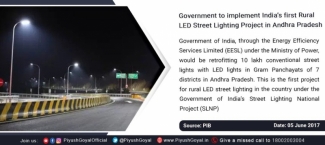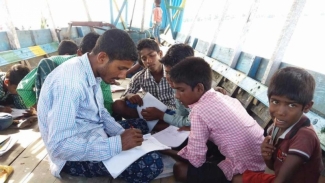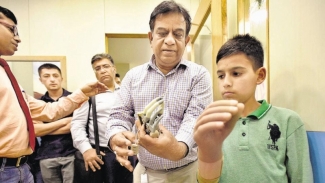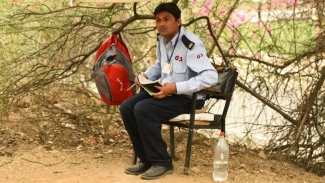
Deendayal Antodaya Yojana – National Rural Livelihoods Mission (DAY-NRLM) is a flagship programme of the Ministry of Rural Development (MoRD) that seeks to alleviate rural poverty through building sustainable community institutions of the poor. The centrally sponsored programme is implemented in partnership with the State governments. The Mission, launched in 2011, has seen a rapid expansion in the last three years. During FY 17-18, 820 additional blocks were covered under the “Intensive” strategy. Cumulatively, the Mission is being implemented in 4,459 blocks spread across 586 districts of 29 States and 5 Union Territories (UTs).
The financial year 2017-18 has seen more than 82 lakh households mobilized into 6.96 lakh Self Help Group (SHGs) across the country. Cumulatively, more than 4.75 crore women have been mobilized into more than 40 lakh SHGs. Further, the SHGs have been federated into 2.2 lakh village level federations and more than 19,000 cluster level federations. Cumulatively, these community institutions have been provided more than Rs. 4,444 crore as capitalization support.
As part of its financial inclusion strategy, the Mission closely works with the Department of Financial Services (DFS), Reserve Bank of India (RBI) and the Indian Bank Associations (IBA) to provide bank credit to SHGs.
Financial Services in Remote Areas
The Mission has also achieved significant success in improving the last mile delivery of credit services through the agency of SHGs. About 1,518 SHG members have been deployed as Banking Correspondents Agents (BCAs) to provide last mile financial services including deposit, credit, remittance, disbursement of old age pensions and scholarships, payment of MGNREGA wages and enrollment under insurance and pension schemes. As of Feb,’18, 1.78 Lakh SHG members had availed banking services through the BCAs and over 8.9 lakh transactions amounting to Rs. 187.92 crores had been completed.
Interest Subvention
DAY-NRLM also provides Interest Subvention to women SHGs availing bank loans amounting to Rs.3.00 lakhs, to subsidize the cost of borrowing. The interest subvention effectively reduces the cost of borrowing to 7% per annum. In respect of 250 districts, an additional interest subvention of 3% is also allowed on timely repayment of loans, reducing the effective interest rate to 4% per annum. Since the inception of the scheme, a cumulative amount of Rs. 2,324 crores has been provided as interest subvention.
Mahila Kisan Shashaktikaran Pariyojana and Value Chain Initiatives
In order to promote agro-ecological practices that increase women farmers’ income and reduce their input costs and risks, the Mission has been implementing the Mahila Kisan Shashaktikaran Pariyojana (MKSP). As of March 2018, more than 33 lakh women farmers were being supported under this scheme. Further, about 8 lakh Mahila Kisans have been mobilized into 86,000 Producer Groups (PGs) which are federated into 126 Producer Companies (PCs). These value chain development initiatives have contributed significantly to the farmers’ income from agriculture, horticulture, dairying, fisheries and Non-Timber Forest Produce (NTFP) related activities. Small and marginal farmers producing Maize, Mango, Floriculture, Dairy, Goatery etc., have benefited significantly through the value chain interventions across different states. As of February 2018, more than 1.05 lakh SHG members have been covered under these interventions. In order to enhance agricultural productivity, the Mission promoted 4,150 Custom Hiring Centre/ Community Managed Tool Banks across multiple States. These hiring centers enable small and marginal famers to hire farm equipment and services such as soil testing, cold chain management etc., at nominal rates.
Community Livelihood Professionals
The community driven implementation strategy is the cornerstone of the Mission. This is borne out by the fact that more than 1.72 lakh community members have been trained and deployed to provide support to the community institutions in a variety of themes, such as bookkeeping, training and capacity building, financial services etc. This also includes more than 22,000 Community Livelihoods Resource Persons (CLRPs) such as Krishi Sakhi and Pashu Sakhi who provide 24 X 7 door step extension services to the small and marginal farmers including dairy farmers.
Start-up Village Entrepreneurship Programme & Aajeevika Grameen Express Yojana
As part of its non-farm livelihoods strategy, DAY-NRLM is implementing Start-Up Village Entrepreneurship Programme (SVEP) and Aajeevika Grameen Express Yojana (AGEY). SVEP aims to support entrepreneurs in rural areas to set up local enterprises. Implemented in 17 States since 2016-17, about 16,600 enterprises have been supported under SVEP resulting in gainful employment for about 40,000 persons.
Aajeevika Grameen Express Yojana (AGEY), was launched in August 2017 to provide safe, affordable and community monitored rural transport services to connect remote rural villages. As of March 2018 proposals from 17 States have been approved and 288 vehicles are operating.
Deendayal Upadhyaya Grameen Kaushalya Yojana
DAY-NRLM has another sub-scheme viz., Deendayal Upadhyaya Grameen Kaushalya Yojana (DDUGKY). DDUGKY aims at building placement linked skills of the rual youth and place them in relatively higher wage employment sectors of the economy.
In FY 2017-18, as of Feb’18, 1.28 lakh rural youth have been trained and 69,320 have been placed. During the financial year 2017-18, 514 projects for training 5.93 lakh rural youth have also been sanctioned across the country till Feb 2018. Further, KAUSHAL PANJEE- mobile app for registration of prospective training candidates was also launched. As of 31st March, 2018, 7.56 lakh candidates have been registered in the Kaushal Panjee application.
The CIPET and Indo German Tool rooms have also been engaged as Project Implementing Agency of DDUGKY program for high end training with better placement & salary.
Rural Self Employment Training Institutes
The Mission, in partnership with 31 Banks and State Governments, is supporting Rural Self Employment Institutes (RSETIs) for skilling of rural youth to take up gainful self-employment. At present 586 RSETIs in the country are supported by the Mission. These RSETIs cover 566 Districts in 28 States and 4 UTs. In FY 2017-18, a total of 4.23 lakhs candidates have been trained and 3.34 lakhs candidates have been settled. Of those settled, 1.52 lakhs candidates have successfully got credit-linkage from banks for setting up their ventures, including 8911 candidates who have got loans under PM Mudra scheme. Out of total candidates trained in RSETIs, 60% are women.
In FY 2017-18, RSETI scheme has been aligned with Common Norms for Skill Development schemes and National Skill Qualification Framework. A total of 26 RSETIs have completed construction of their own buildings in FY 2017-18. Cumulatively, since FY 2014-15 till FY 2017-18 a total of 16.97 lakhs candidates have been trained and 12.51 lakhs candidates have been settled.
Key Priorities for the Mission for FY 2018-19
Mission Expansion
The Mission seeks to expand to 750 additional blocks during FY 2018-19. The focus of expansion will be 102 aspirational districts, 50000 Mission Antyodaya GPs, clusters identified under Shayama Prasad Mukherji Rurban Mission and Sansad Adarsh Gram Yojana (SAGY) GPs. It is proposed to mobilize 100 lakh households into 9 lakh Self Help Groups during the financial year.
Promotion of Farm Livelihoods
DAY-NRLM plans to include another 5 lakh women farmers under its farm livelihoods interventions like sustainable agriculture, livestock and NTFP based activities with major focus on North East states. Further, the Mission aims at supporting an additional 75000 SHG member households through farm-based value chain initiatives. It would also promote 15 large size farm-based producer enterprises to provide market linkages to women producers.
In addition, organic cultivation will be promoted in 1000 village clusters across States. Besides, to strengthen the extension services to small and marginal farmers on sustainable agriculture, improved livestock management and NTFP related activities an additional 3000 Community Resource Persons would be developed through intensive training. DAY-NRLM has also planned to promote another 1500 Custom Hiring Centre to enable the small and marginal farmer having timely access to agriculture implements and machinery.
Promotion of Non-Farm Livelihoods
It is also expected that Start Up Village Entrepreneurship Programme (SVEP) will support an additional 25000 entrepreneurs during the year 2018-19. In addition, it is expected that by March 2019, about 1500 vehicles will be operating across 17 States under Aajeevika Gram Express Yojana (AGEY).
Setting up of Rural Haats
Development of haats has emerged as one of the most important strategies to market SHG products and agricultural produce. To facilitate marketing of rural produce, it is proposed to set up haats at village and block levels in convergence with MGNREGS and the District and State level using DAY-NRLM resources. The maintenance of the haats will be entrusted to a committee comprising of representatives of women SHGs, Panchayati Raj Institutions (PRIs) and local government officials.
It is proposed to set up 4567 rural haats across the country during FY 2018-19
Enabling rural poor’s access to formal sources of finance
The Mission will continue to promote access of SHGs to bank credit and other financial services. In FY 18-19, it is planned to link 22 lakh SHGs to bank credit for total loan amount of Rs. 42500 crores, taking the SHG Bank loan outstanding to Rs. 75000 crore.
The Mission will make efforts to expand Banking services to under-served regions through alternate channels in partnerships with various banks.
Deendayal Upadhyaya Grameen Kaushalya Yojana
More emphasis will be placed on long-term training for better placement outcomes. The Industries will be invited to partner as Project Implementing Agency (PIA) and/or own a training batch. It is proposed to have proactive engagement with Industry heads through workshops & conferences. It is envisaged that the increased engagement of Institutions of MSME & other prestigious Government Institutions for taking up DDUGKY program will lead to high end training with better salaries & District-wise survey for skilled manpower requirement.
The overall budgetary allocation has been increased from Rs 810 Crores in 2017-18 to Rs 1200 Crores in 2018-19
Rural Self Employment Training Institutes
An increased involvement of State Government has been envisaged in planning and implementation of skill development of rural poor through RSETIs. This would facilitate better mobilization (using Kaushal Panjee app) and identification of needy candidates in rural poor households. The mission is launching Standard Operating Procedures for greater transparency, efficiency and Quality assurance in the implementation of skill training in RSETIs. Mission is facilitating partnership of Industry Bodies with RSETIs to enable scaling up of rural entrepreneurs.











